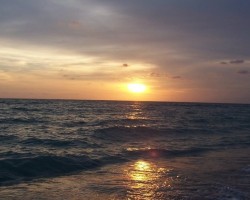
He sat on the beach, his feet deep in wet sand and sinking deeper with each caress of the sea. He was old now. He knew not how old. Long ago he had ceased in the counting of days, finding no meaning in them. He knew he was old because his joints ached and his bladder leaked. He knew he was old because his beard was white and his back bent. Though the seasons were marked out with gentle undulations of rain and tide, still they passed, and they changed him.
When he had first struggled onto the beach, soaked and fatigued to the limits of his abilities, he had been young. How time had expanded! Each of those early days had been a marathon of starvation and survival, a relentless triathlon of scavenging, scraping, and settling. To survive a week had seemed a miracle. The passing of two was a hurdle overcome. A month was a milestone worthy of a day of rest. If he had known how short a month was, he would have surrendered to despair. He had eked out a lifetime, and now it seemed too short.
On this beach he had spent long nights in terrible agitation. On this beach he had wept for corpses of the men he used to be. He had been a writer in the civilized word, enchanted by language and sure of its efficacy; convinced of his special dispensation of imagination; praised by friend and stranger; confident of his power to change lives.
His book, labored over, had drowned, though he had lived.Writer—that was the first corpse buried in the sand. More than once he had tried to find a way to revive the decaying body. When shelter needed his hand, he turned instead to berries and bark and stone. His whole destiny in life was to write. It had been his vocation and calling.
Gone. Unimportant. Superfluous.
And so he wept in the night.
The second corpse he buried was Husband. Held close to the chest, it kept the warmth of life for quite a while. Love outlived pride, and hope of rescue kept the Husband’s heart beating for a long, long time. One day, he realized he could no longer recall his wife’s face clearly. That corpse he buried weeping for his own loss. Later, he learned to weep for hers.
Days passed, years passed, before the third and final corpse lay in the sand. He had widowed his wife of six years. They had not yet begun a family. This occurred to him and filled him with desolation. None to call his own. None to love as his flesh and blood. None to carry on after him. Slow and unexpected, the death of Father was a bitter blow that hung over him like a fog that only slowly dissipated.
And what was left of him? Nothing. Only Man.
He survived. He took small comforts, engaged daily beauties, suffered hardship, ate and drank, slept and worked the land. He did what was necessary; when he had leisure, he enjoyed what he could. He had almost forgotten his name.
He sat on the beach, his feet in the wet sand, sinking, sinking, slowly into the earth. He spoke to God. Man still had that. It was all he needed.
Another corpse would lie upon the beach soon, and he would be forgotten by all mankind. A month’s growth and rain would destroy all his work here. A few artifacts might survive a number of years. But would anyone ever find it?
He had stopped asking such questions. Alone with the God he had hardly known when he meant to change the world, the question lost its power.
He stood, a bit unwillingly, to begin the day’s work.
This story touched me, particularly the part when the man loses his identity as Father. Even though he never owned that identity, I can completely identify with that feeling of loss. Before I had my baby, before I even knew I could have a baby, I used to think about my husband dying and leaving me without his child and legacy. It tears you up.
Haunting.